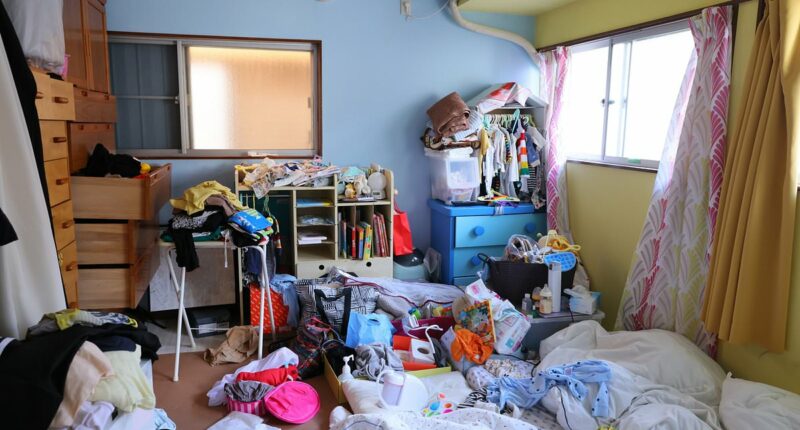Share this @internewscast.com
As irritating as it may be to admit, ‘mess equals stress’ isn’t just a catchy phrase—it’s backed by science. Clutter really can harm mental health.
Psychotherapists warn that holding on to possessions for too long can create ‘an emotional prison that is difficult to escape’.
Dr. Katie Barge mentioned to the Daily Mail that the saying ‘tidy home, tidy mind’ is backed by research, especially impacting women, those with mental health issues, and individuals with ADHD more noticeably.
‘It’s a vicious cycle,’ she explained.
‘The more prone you are to stress and anxiety, the more likely you are to have a cluttered home, which then feeds into that stress and anxiety.
‘Stress feeds clutter, and clutter feeds stress.
‘Our brains see clutter as visual noise, which makes it harder for us to focus and relax.
‘Clutter tends to feel exhausting because it leads to decision fatigue. Instead of focusing on the next task, people find themselves wondering whether to tackle the mess, which takes up mental energy.’

Psychotherapists warn that holding on to possessions for too long can create ‘an emotional prison that is difficult to escape’
Often, homes serve as repositories of personal history, containing holiday memorabilia, closets overflowing with seldom-worn attire, and the notorious ‘miscellaneous’ drawer that is better off untouched.
While being surrounded by tangible memories of the past might seem comforting, studies indicate that excessive clutter can be detrimental to health, and once people become aware of the need for change, initiating it can feel daunting.
‘There’s a tipping point,’ Dr. Barge explained. ‘When a home becomes excessively messy and cluttered, it creates a sense of overwhelm, making it challenging for the brain to focus on even one small area to clean up.’
A 2009 study by UCLA found a direct link between messy homes and high levels of cortisol, the body’s stress hormone.
The researchers concluded that women living in cluttered households produced more cortisol than those in tidier environments.
There are many reasons why clutter builds up.
The accumulation may stem from sentimental value, the remorse of overspending on unused items, or optimistic expectations that they might be needed ‘someday’.
Families face extra challenges as children outgrow clothes and toys faster than they can be thrown away, creating yet another mountain of mess.
And clutter can even be passed down through generations. ‘If we grew up in cluttered homes, we’re more likely to have a cluttered home,’ Dr Barge added.
At the most extreme end of the scale are hoarders—people whose homes become unliveable due to the sheer volume of possessions they accumulate, some of them decades old, broken or rotting.
‘Often hoarding is linked to attachment needs, it really relates to childhood and our inner child,’ she explained.
‘The need to hold on to things sentimentally can often be because we didn’t get the kind of nurture that we wanted from our parents, so we develop sentimental attachments to birthday cards and things like that, where people show their love.
‘Similarly, we’ll just hold on to silly things that have those kind of values to us – it’s an attachment response.’
As a psychotherapist, Dr Barge has worked with scores of hoarders and others struggling to sift through box after box of personal items.
‘Quite often I’ll use guided meditation and hypnotherapy with them to release the association with the object and the emotion,’ she said.
‘It usually goes back to something like the death of a parent when they were young, or parents divorcing, or when their children move out of home and they get that empty nest feeling.

Researchers concluded that women living in cluttered households produced more of the stress hormone cortisol than those in tidier environments
‘I help them see that the emotion they’re attaching to – whether it’s their child’s love, or the love that they’re looking for – isn’t in that object.’
Dr Barge also offers her clients practical advice. ‘I tell them to start with one small space, even just one drawer,’ she said. ‘If the whole house is cluttered, we’ll let it get worse and worse because tackling it in one go just feels too overwhelming.’
Her views are echoed by Ingrid Jansen, who co-hosts The Declutter Hub Podcast with Lesley Spellman.
‘Living with clutter means making hundreds of tiny decisions every day: where is that thing, do I need it, what should I do with it? That’s exhausting and creates decision fatigue,’ she told the Mail.
‘Holding onto outdated belongings – such as old clothes, textbooks or ornaments – often ties people to past versions of themselves. Instead of helping us cherish memories, these items can weigh us down and stop us moving forwards.
‘In the end, decluttering isn’t just about creating a tidy home. It’s about creating a calmer mind, stronger routines and better wellbeing. More space in your home really does mean more space in your head – and that means more calm in your life.’
The psychology of hoarding has long held public fascination, spawning a string of hit television shows.
Programmes such as Hoarders in the US and Britain’s Biggest Hoarders on the BBC have drawn millions of viewers, shocked by the sight of homes so full of possessions they are virtually uninhabitable.
Experts say part of the appeal lies in the extreme contrast: while most people may wrestle with a messy drawer or an overstuffed wardrobe, seeing lives overwhelmed by clutter on such a scale can be both horrifying and strangely compelling.
The shows also shine a light on the deeper emotional struggles behind hoarding, exposing how what looks like ‘junk’ from the outside can carry powerful psychological meaning.












